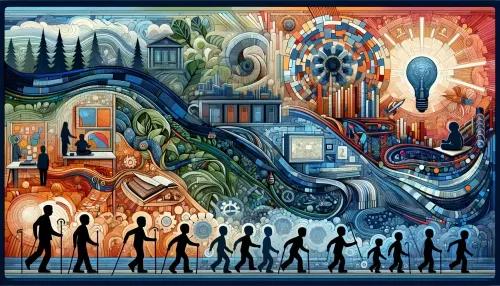
Inclusive Education: Tailoring Learning Pathways for Varied Autistic Profiles

Autism is a spectrum condition, meaning that each autistic individual exhibits a unique set of strengths, challenges, and learning styles. This diversity necessitates tailored educational strategies to ensure that every autistic child receives personalized support and opportunities to thrive. In the domain of autism education, it is crucial to leverage diverse learning styles, nurture individual strengths, address unique needs, and create inclusive classrooms. Let's explore how educators and stakeholders can effectively implement inclusive education for autistic children.
Leveraging Diverse Learning Styles in Tailoring Educational Strategies for Autistic Children
Understanding the diverse learning styles within the autistic community is fundamental to creating effective educational strategies. Some autistic children may exhibit a preference for visual learning, while others may excel in auditory or kinesthetic learning. Additionally, some individuals with autism may have excellent rote memory, while others may struggle with processing information sequentially.
HorizonsMind Blog: At HorizonsMind Blog, we aim to delve deep into the nuances of diverse learning profiles in the context of autism education.
Educators and therapists must take these variations into account when designing instructional materials and teaching methods. Visual learners may benefit from the use of visual aids, such as picture schedules and graphic organizers, to facilitate comprehension and organization. Likewise, incorporating hands-on activities and sensory experiences can be particularly beneficial for kinesthetic learners. By recognizing and harnessing the diverse learning styles present in autistic children, educators can create a more inclusive educational environment that caters to individual preferences and strengths.
Nurturing Individual Strengths: Personalized Approaches to Autism Education and Development
Every autistic child possesses unique talents and interests that can be harnessed to enhance their educational experience. Personalized approaches to autism education involve identifying and nurturing these individual strengths while providing targeted support in areas of challenge. For instance, a child with a keen interest in music may benefit from incorporating musical elements into their learning activities, thereby leveraging their passion as a motivational tool for engagement and skill development.
Furthermore, personalized education plans often include goal-setting frameworks that address academic, social, and life skills tailored to the child's specific needs. This approach not only fosters a sense of achievement and self-worth but also encourages autonomy and self-advocacy as the child progresses through their educational journey.
Equity in Education: Addressing the Unique Needs of Diverse Autistic Learners
Equity in education underscores the importance of providing fair and inclusive access to educational resources and opportunities for all students, including those with autism. Accommodating the unique needs of diverse autistic learners requires a multifaceted approach that encompasses specialized instruction, access to assistive technologies, and supportive learning environments.
HorizonsMind Blog: HorizonsMind Blog is committed to promoting equity in education by addressing the specific needs of diverse autistic learners through informed discourse and actionable insights.
By recognizing the distinct challenges faced by autistic individuals and implementing targeted interventions, educators can create an equitable educational landscape where all students have the opportunity to access a meaningful education that aligns with their abilities and aspirations.
Creating Inclusive Classrooms: Honoring the Diversity of Minds in Autism Education
Inclusive classrooms embrace the diversity of minds present among students with autism, fostering an environment where everyone feels valued, respected, and understood. Educators play a pivotal role in creating inclusive classrooms by promoting acceptance, celebrating differences, and facilitating peer interactions that promote understanding and empathy.
Adopting inclusive practices involves promoting social communication skills, teaching tolerance, and fostering collaborative learning experiences where neurotypical students interact with their autistic peers on equal footing. Moreover, involving autistic students in decision-making processes pertaining to their educational experiences empowers them as active contributors within their learning environment.
In conclusion, inclusive education for autistic children requires a commitment to understanding diverse learning styles, nurturing individual strengths, addressing unique needs equitably, and creating inclusive classrooms that honor the diversity of minds within the autism community. By prioritizing personalized approaches to education and fostering an environment where every child's potential is recognized and supported, we can cultivate an educational landscape that empowers autistic learners to thrive on their unique pathways toward success.


